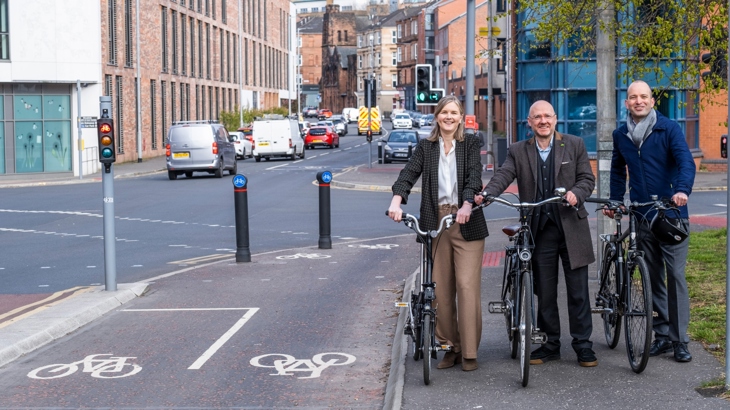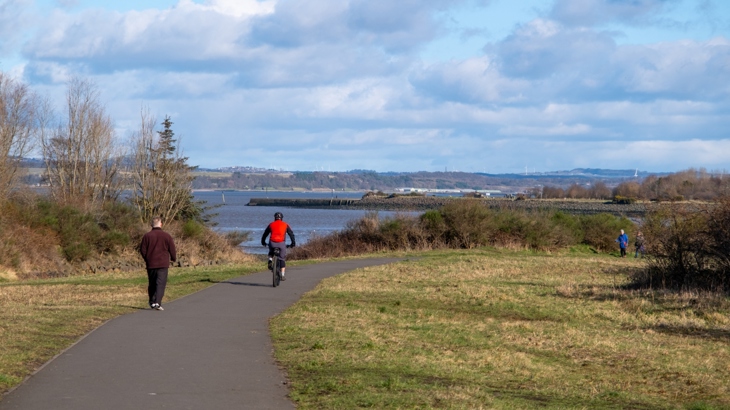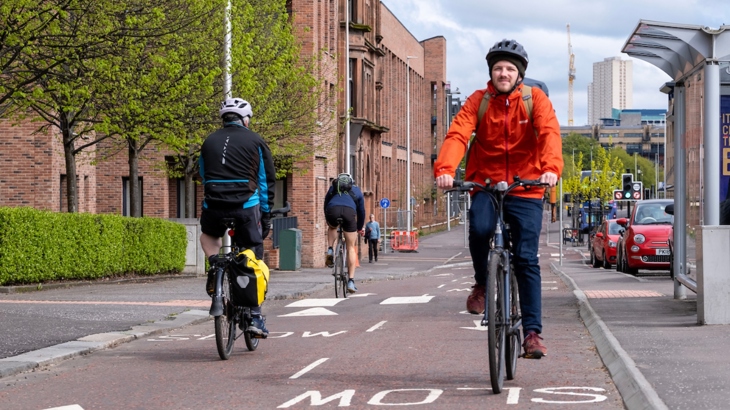On 25 April 2023, the Scottish Government published its vision for increasing everyday cycling across Scotland. Karen McGregor, Scotland Director at Sustrans, explains why this is an important step towards rebalancing our transport system in favour of communities throughout the country.

The Scottish Government recently published the Cycling Framework for Active Travel. Credit: McAteer Photography.
The Scottish Government recently published the Cycling Framework for Active Travel – a new plan that outlines how to increase everyday cycling across the country.
The Framework has been developed after extensive public consultation, and in partnership with Sustrans, Cycling Scotland and local authorities.
It will make cycling more accessible and transform our communities into healthier, happier places.
The delivery plan focuses on six key themes:
- Safe cycling infrastructure
- Effective resourcing
- Fair access
- Training and education
- Network planning
- Monitoring.
The Framework has given us the tools and guidance to work with and for our communities to deliver real change.
But what could this change look like? How do we move forward and rebalance our places and transport systems, putting Scottish people and communities at the forefront?

The Framework lays out the Scottish Government's plans on how to engage communities in towns and cities like Glasgow. Pictured at the Framework launch from left to right: Sustrans Scotland Director Karen McGregor, Minister for Active Travel Patrick Harvie MSP, and Chief Executive of Cycling Scotland Keith Irving. Credit: Chris Watt.
What is the Cycling Framework and why is it important?
By 2030 the Scottish Government want walking, wheeling and cycling to be the main modes of transport for short, everyday journeys.
This sounds ambitious, but as we are all too aware, urgent action is needed to tackle the health and climate crises we face in Scotland.
And this is where the new The Cycling Framework comes in.
It sets out the key priorities and actions required for government, councils and active travel organisations to realise the 2030 vision, as well as the long-term funding available to deliver them.
With the Framework, partnerships and funding in place, we can expect a lot of positive change across the country.
Creating safe cycling infrastructure which works for everyone
We already know that the number of people using cycles for everyday journeys increases in places where there is investment in accessible, segregated cycling infrastructure.
That’s why we are pleased to see a commitment to creating safe, high-quality routes in both urban and rural areas in the new Framework.
And this isn’t just about creating cycle lanes – it gives us an opportunity to improve place making.
This means creating neighbourhoods with social connection at their heart, and green spaces in our towns and cities which increase our sense of wellbeing and improve biodiversity.
With decades of experience in delivering places and paths for everyone, we are looking forward to providing expertise and support to help our partners deliver people-first projects and joined-up networks quickly and impactfully.

The Cycling Framework sets out the key priorities and actions required to make walking, wheeling and cycling the main modes of transport for short, everyday journeys.
Effective resourcing to deliver projects on the ground
Investment in everyday walking, wheeling and cycling journeys is already improving lives across Scotland.
In the past few weeks alone, we have seen infrastructure delivery and planning announced by councils in Glasgow, Edinburgh, Inverclyde and Orkney.
As laid out in the Cycling Framework, by 2024-25 the active travel budget will have grown to £320 million or 10% of the transport budget (whichever is greater).
This funding will see an increase in the pace and scale at which we can create more cohesive, inclusive and connected networks of routes, streets and spaces.
Equal access to cycling
Active travel has a key role to play in making Scotland greener, healthier and fairer.
To make this happen, walking, wheeling and cycling must be an attractive choice for everyone, regardless of age, background or ability.
The new Framework recognises this as a key priority and sets out how access to cycles, including adaptive cycles, e-cycles and cycle shares will be expanded across the country.
We welcome this and will continue to work with our partners to ensure new developments reflect the diverse and individual needs of all Scotland’s communities.
Training and education for people of all ages
The new Framework will build on and improve the cycle training and education offers that are already available in Scotland.
This includes children learning to ride in pre-school, on-road Bikeability training and cycle awareness courses for adults.
Making sure everyone has the confidence to walk, wheel and cycle for their everyday journeys has a really important role in encouraging all of us to leave the car at home more often.

Sustrans looks forward to supporting our partners to create more sustainable and better-connected communities which serve and work for the people living within them. Credit: McAteer Photography
Network planning based on local active travel strategies
Listening to and working with people who live and work in Scotland’s cities, towns and villages creates better and more liveable places for everyone.
Through the Cycling Framework, local authorities in Scotland will be asked to produce active travel strategies for their area.
By working with and for their communities, they will plan networks and projects which connect people and make our neighbourhoods safer and more accessible.
These strategies will look at plugging gaps in the infrastructure we have in Scotland at the moment, as well as promoting health and inclusion.
Monitoring the impact of active travel investment
We all know and appreciate the changes detailed within the new Framework will not happen overnight.
We also know that there will be many learnings along the way.
And this is why monitoring is so important.
Expanding the monitoring and reporting of cycling levels at local, city, regional and national levels will ensure we are able to better judge the impact of active travel investment and apply these learnings in future projects.
A landmark year for active travel in Scotland
2023 is fast becoming a significant year for cycling in Scotland.
The publication of the new Cycling Framework is the latest in a steady stream of positive announcements aiming to increase rates of everyday active travel across the country.
More than ever before people are asking for change and for choice.
The investment commitment by the Scottish Government over the next decade will be key to delivering the 2030 vision.
Councils must now take this opportunity to give everyone in Scotland the chance to make healthier and happier journey choices.
We look forward to supporting the Scottish Government, local authorities and our active travel delivery partners to create more sustainable and better-connected communities which truly serve and work for the people living within them.
Find out more about our work in Scotland.
Read our response to the Scottish Government’s new National Planning Framework.





